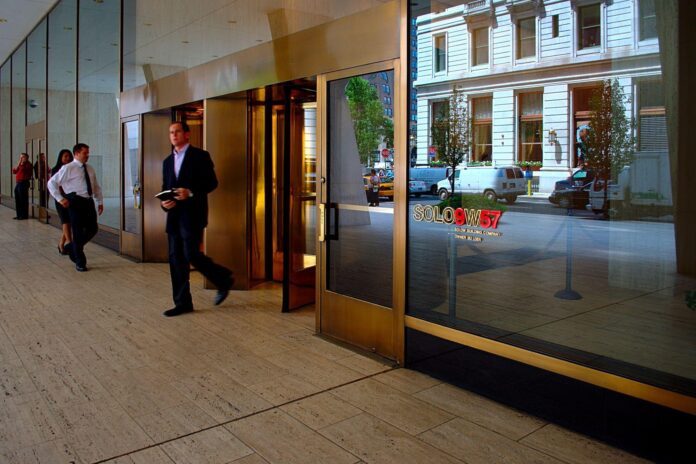Alive, real estate developer Sheldon Solow (1928-2020) achieved great things, building scores of high-end commercial and residential properties throughout New York City and amassing an art collection of mostly Modern and post-war artists so vast that he created a foundation and private museum to house it all, on 57th Street in Manhattan, right of Fifth Avenue. However, billions of dollars, good taste in art and his passing at the age of 92 did not shield him from ridicule.
It is all because of that foundation, the Solow Foundation, which is not open to the public and provides no educational or other benefits to the public—seemingly a requirement of non-profit incorporation—yet is exempt from paying taxes. All of which raised the hackles of Ethan Arnheim, a New Yorker who describes himself as “an art enthusiast, consultant on international development issues” and “a bit of an activist”. A resident of Washington, DC, he was in Manhattan visiting family members in 2017 and walking along 57th Street when he glimpsed some artworks through the window of an office building—9 West 57th Street, also known as the Solow Building—but was not permitted to enter that building. He later learned that the artworks were part of a foundation’s collection but that the foundation denied access to these and other artworks. “It’s an important issue to me, gets me really infuriated that organisations can get tax-exempt status for doing nothing that benefits the public,” Arnheim says.
To publicise his criticism, Arnheim started in 2017 a satirical website, Solow Art and Architecture Foundation, to call attention to what he viewed as an inequity of the tax system and generally ridicule the actual foundation as a tax dodge. “My goal with the site has been to increase awareness around the issue of private museums,” he says. “Ultimately, I would like to see the tax law changed to require some public benefit if an entity is going to retain its non-profit status to allow tax deductible donations.”
A principal example of his ridicule is a part of the website noting the daily hours for the foundation:“Monday: Inaccessible.Tuesday: Closed. Wednesday: No public hours.Thursday: Not open.Friday: Same as the rest of the week.Saturday: None.Sunday: Absolutely not.”
To ensure that the Solow Foundation was aware of this satire, Arnheim registered four domain names that refer to Sheldon Solow: solowfoundation.org, solowfoundation.com, sheldonsolow.com and sheldonsolow.org. The ridicule caught the Solow Foundation’s attention, and it charged Arnheim with a form of cybersquatting—registering a domain name that makes use of someone else’s trademark. Last month, that claim was heard by the World Intellectual Property Organization, which ruled that the Solow Foundation had “failed to establish any relevant trademark rights” because “it had no trademark registrations nor any common law trademark rights”, according to Douglas M. Isenberg, an Atlanta, Georgia lawyer who represented Arnheim in this dispute.

Ethan Arnheim, who maintains the satiric Solow Foundation website, visits collectors Don and Mera Rubell’s new museum in Washington, DC Courtesy Ethan Arnheim
“Ethan was looking for a way to draw attention to the issue of private foundations that are given tax-exempt status while providing no benefit to the public, and the Solow Foundation’s filing with WIPO ended up bringing even more attention to it,” Isenberg says. “Probably, the Solow Foundation thought that going through WIPO would be a slam dunk and keep the issue quiet.”
In the end, this was a domain name dispute that has no bearing on what a private foundation can or cannot do under the law.“The website has succeeded in bringing at least some attention to the issue,” Arnheim says. “Gale Brewer, Manhattan Borough President, tweeted that ‘It is outrageous that a private art collection not open to the public gets a tax break!’ in response to 2018 media coverage of the website. I think that the site has pressured the Solow Foundation to change its policies, and may give pause to anyone considering the same ploy.”
Representatives for the Solow Foundation did not respond to multiple requests for comment. The foundation’s collection includes works by Alexander Calder, Vincent van Gogh, Joan Miró, Jean-Michel Basquiat, Balthus, Francis Bacon, Alberto Giacometti, Franz Kline, Morris Louis, Henri Matisse, Amedeo Modigliani, Henry Moore, Pablo Picasso and Mark Rothko. The collection’s combined value has been estimated to be in excess of $500m. In early 2021, the collector’s estate sold a painting by Sandro Botticelli, Portrait of a Young Man Holding a Roundel (1444-1510), at Sotheby’s in New York for $92m.
Private, non-profit museums that enjoy tax-exempt status but do not serve the public interest have been the subject of congressional scrutiny periodically, most recently in 2015 when the Senate Finance Committee looked into a number of these institutions. In a letter to the commissioner of the Internal Revenue Service, Finance Committee Chairperson Orrin Hatch cited “operating museums that provide limited benefits to the public while enabling donors to reap substantial tax advantages”. He concluded that “this area of the tax code is ripe for exploitation”.
The actual Solow Foundation announced plans to open to the public at some point in 2023, although the exact date has not yet been revealed. “We’ve asked repeatedly when the museum will open to the public,” Isenberg says. “They’ve only provided conflicting information. I don’t even know if the claim that it will open is even accurate.”

























